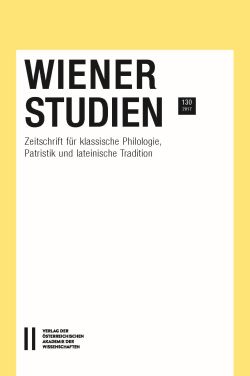|
 |
INHALT
Chris E c k e r m a n, Pindar’s Olympian 1, 1 – 7 and its Relation to Bacchylides 3, 85 – 87
Gregor B i t t o, Pindars Gedächtnis. Dichtung und Physiologie in den Scholien zu Ol. 10, 1
Almut F r i e s, Pindar, Hieron and the Persian Wars: History and Poetic Competition in Pythian 1, 71 – 80
Christian V a s a l l o, Demades’ Natural Flair for Rhetoric: Some Notes on the Extant Herculanean Evidence
Michael K r e w e t, Polybios’ Geschichtsbild. Hellenistische Prinzipien seiner Darstellungen menschlichen Handelns
Tomáš V í t e k, Allegorical Dreams in Antiquity: Their Character and Interpretation
Maria Y p s i l a n t i, Ἀνάλκιδες Ἀθῆναι: Femininity and its Absence in Colluthus’ Rape of Helen
Felipe G. Hernández M u ñ o z, Notes on the Sources of the Aldine Edition of Menander Rhetor
Paola G a g l i a r d i, Tua cura, Lycoris: lessico erotico e schema Cornelianum da Virgilio agli elegiaci nel segno di Gallo
Maurizio Co l o m b o, Note di critica testuale ad Ammiano Marcellino
Donato D e G i a n n i, Sfumature semantiche e diffusione di un neologismo tardoantico. Sinuamen da Giovenco a Venanzio Fortunato
Francesco L u b i a n, Prud. psych. 1 – 4: l’invocazione e l’aretalogia relativa al Figlio
Juri L e o n i, Gli Acta sancti Marcelli centurionis (BHL 5253 – 5255a). Studio della tradizione ed edizione critica
Alfred B r e i t e n b a c h, Zur Komposition des poetischen Florilegiums im Codex Salmasianus
|




 Home
Home
 Print
Print
 References
References
 Share
Share
